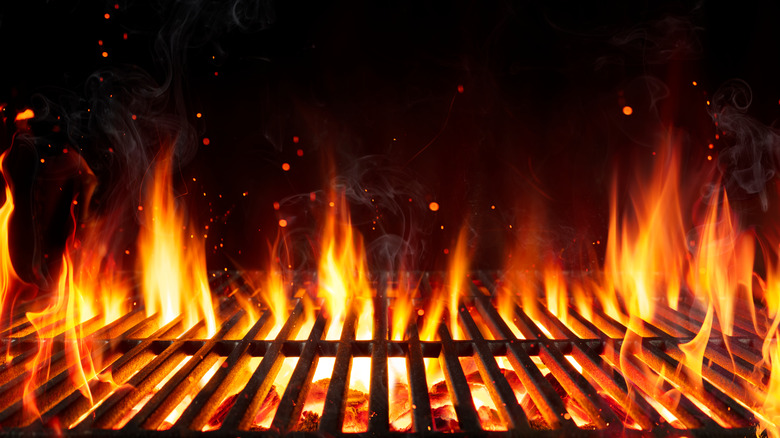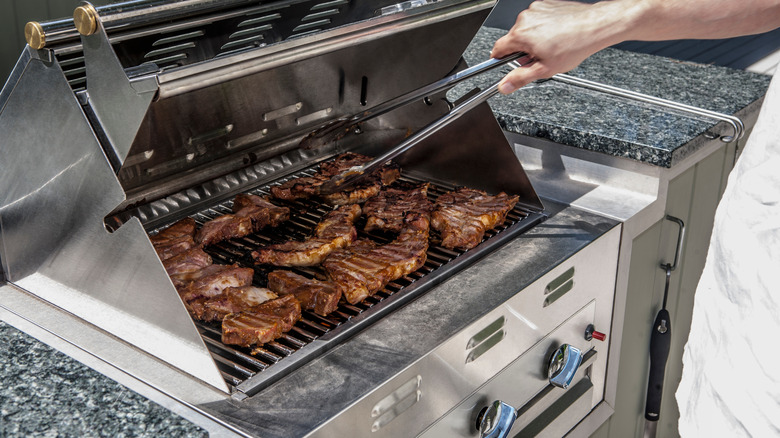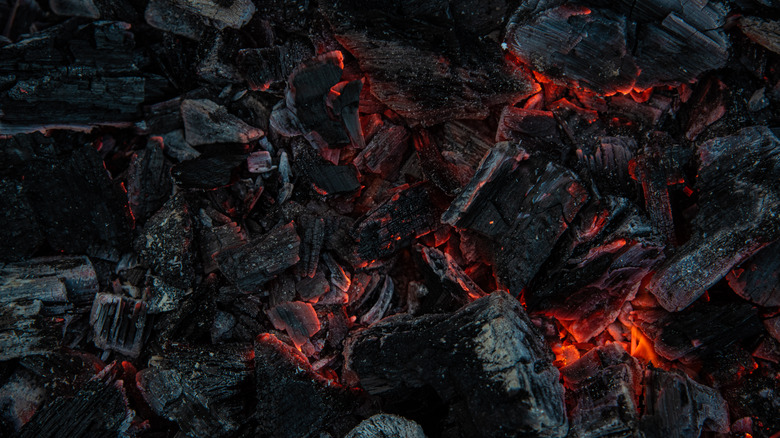Gas Vs. Charcoal Grills: What's The Best Choice?
"I sell propane and propane accessories." Thus says Hank Hill, the main character on the animated sitcom "King of the Hill." In the series, Hill is the senior assistant manager at the fictitious Strickland Propane and is well-known for his reverence toward all things propane — to the point where he considers charcoal to be something of blasphemy. One of the reasons why Hill loves propane is that when you cook a steak on a propane grill, you "taste the meat and not the heat." But just how true are Hill's claims? Is there any real difference between using a propane grill versus a charcoal grill?
Popular Mechanics tells us that the concept of grilling can be traced back to the cooking styles of the 17th-century Arawak people, where meats were cooked on a bed of sticks over a fire. While the tribes of yesteryear didn't have the luxury of buying a bulk bag of charcoal at their local grocer, it was only until the early 20th century that the charcoal briquette came about. Some such as Cinders Barbeques credit Ellsworth B. A. Zwoyer with patenting the charcoal briquette in the late 1800s, while others such as Grills Forever detail how the Henry Ford Company helped to popularize the briquette to help reduce waste scraps from its automotive plants.
The gas grill came about in the 1960s, Bar-S tells us, as a way to help people to purchase more natural gas. But which grill, if any, is truly the king of backyard barbeques?
What does a propane grill offer?
A propane grill is exactly what it sounds like: a grill that uses propane as a fuel for heat, which in turn produces fire to cook the food. While Hank Hill could no doubt sell you a propane grill by extolling its many virtues, what exactly does a propane grill offer? What are its drawbacks?
According to BBQ Guys, the advantages of a propane grill over a charcoal grill are many. The grill is very quick to use, and it requires only turning a valve or flipping a switch to heat up nearly instantaneously. Many propane grills also offer a wide variety of attachments and features, making them a very versatile appliance. You also have greater control over your temperature than you would with a charcoal grill, thanks to each burner having its own temperature knob, similar to the range on your oven. Propane, being a clean burning gas, also doesn't leave marks or stains on your grill that you have to scrub off.
Propane grills, however, have their own drawbacks. Premium Grills tells us that propane is a much more expensive fuel source and, because it is an incredibly flammable substance, it can also be dangerous if used without proper grill knowledge. There's also the argument that propane lacks any "flavor" that it may infuse into the meat, unlike the smokey taste of charcoal or wood pellets that some look for in their barbeque, although the "clean flavor" may appeal to some more than others.
What does a charcoal grill offer?
You may find yourself in the camp that believes that charcoal briquettes beat the band. "Leave that fancy gas stuff to the amateurs," you say. "Real grillers use charcoal." But what are the real benefits of a charcoal grill? Where does it excel, and where does it need improvement?
According to Home Depot, a charcoal grill offers few select benefits. These can include that smokey, rich flavor mentioned earlier, which can change depending on the type of charcoal you use. Charcoal grills are also relatively lower maintenance than propane grills, as the simple cooking method and the fact that charcoal can burn up fully means that all one needs to do to keep the grill working is clean it out every so often.
A major drawback of the charcoal grill, The Family Handyman tells us, is that it has a long "fire-up" time, clocking in around an average of 30 minutes before the charcoal is hot enough to produce sufficient heat. Charcoal can also be either high or low-quality, depending on the price. While propane can't exactly be "bad," you may find yourself with cheap charcoal briquettes that produce more ash and smoke than any heat.
While neither grill is truly the "best" type of grill, each one excels in a specific field. If you want a grill that has a quick start-up time and good temperature control, you may want a propane grill. On the other hand, if you want a more "traditional" grill, a charcoal grill will also work just fine.


